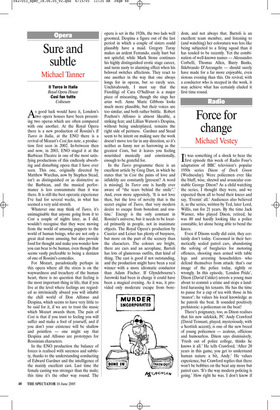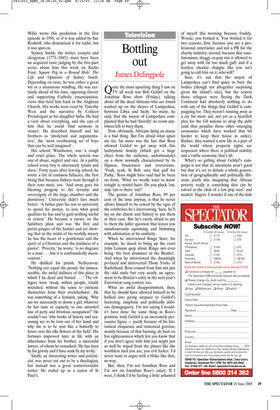Force for change
Michael Vestey
It was something of a shock to hear the first episode this week of Radio Four’s adaptation of BBC television’s popular 1950s series Dixon of Dock Green (Wednesday). Were policemen ever like the bluff, wise, shrewd and avuncular constable George Dixon? As a child watching the series, I thought they were, and we expected them all to bend their knees and say, ‘Evenin’ all.’ Audiences also believed it, as the series, written by Ted, later Lord, Willis, ran for 21 years. By the time Jack Warner, who played Dixon, retired, he was 80 and hardly looking like a police constable, let alone being able to bend the knees.
Even if Dixons really did exist, they certainly don’t today. Cocooned in their hermetically sealed patrol cars, abandoning the solving of burglaries for motoring offences, shooting men armed with table legs and arresting householders who defend themselves from attack: that’s our image of the police today, rightly or wrongly. In this episode, ‘London Pride’, Dixon (David Calder) arrests a young man about to commit a crime and stops a landlord harassing his tenants. He has the time to pause for a cup of tea with those in his ‘manor’; he values his local knowledge as he patrols the beat. It sounded positively prehistoric: a policeman on the beat!
There’s poignancy, too, as Dixon realises that his new sidekick, PC Andy Crawford (David Tennant, played, mysteriously, with a Scottish accent), is one of the new breed of young policemen — zealous, officious and humourless. Dixon says dismissively, ‘Fresh out of police college, thinks he knows it all.’ He tells Crawford, ‘After 20 years in this game, you get to understand human nature a bit, Andy.’ He values experience, but Crawford replies that there won’t be bobbies on the beat any more but patrol cars. ‘It’s the way modern policing is going.’ How right he was. I don’t know if Willis wrote this prediction in the first episode in 1956, or if it was added by Sue Rodwell, who dramatised it for radio, but it was spot-on.
Sydney Smith, the writer, essayist and clergyman (1771–1845), must have been an acquired taste judging by the five-part series about him this week on Radio Four, Square Peg in a Round Hole: The Life and Opinions of Sydney Smith. Depending on taste, he was either a great wit or a monstrous windbag. He was certainly ahead of his time, opposing slavery and supporting Catholic emancipation, views that held him back in the Anglican Church. His works were read by Timothy West and the narrative by Colleen Prendergast as his daughter Saba. He had a view about everything, and she says of him that he could ‘find sermons in stones’. He described himself and his brothers as ‘intolerant and argumentative’, the ‘most overbearing set of boys that can be well imagined’.
His school, Winchester, was ‘a rough and cruel place. The whole system was one of abuse, neglect and vice. At a public school every boy is alternately tyrant and slave.’ Forty years after leaving school, he wrote a list of common fallacies, the first being that because fathers went through it their sons must, too. ‘And away goes his bleating progeny to the tyranny and sovereignty of the large chamber and the dormitory.’ University didn’t fare much better. ‘A father puts his son to university to spend his money, to lose what good qualities he has and to gain nothing useful in return.’ He became a curate on the Salisbury plain and was ‘the first and purist pauper of the hamlet and yet showing that in the midst of his worldly misery he has the heart of a gentleman and the spirit of a Christian and the kindness of a pastor’. ‘Poverty,’ he wrote, ‘is no disgrace to a man ... but it is confoundedly inconvenient.’ He disliked his parish, Netheravon: ‘Nothing can equal the proud, the immeasurable, the awful dullness of this place in which I lie dead and buried.. . ’ The villagers were ‘weak, witless people, totally wretched, without the sense to extricate themselves from their wretchedness’. He was something of a feminist, asking, ‘Why are we necessarily to doom a girl, whatever be her taste or capacity, to one unvaried line of petty and frivolous occupation?’ He couldn’t see ‘why books of history and reasoning are to be torn out of her hand and why she is to be sent like a butterfly to hover over the idle flowers of the field’. His fortunes improved later in life with an inheritance from his brother, a successful lawyer, of whom he remarked, ‘He has risen by his gravity and I have sunk by my levity.’ Smith, an interesting writer and polemicist, was never cut out to be a theologian, but instead was a great controversialist writer. He ended up as a canon of St Paul’s.

















































 Previous page
Previous page